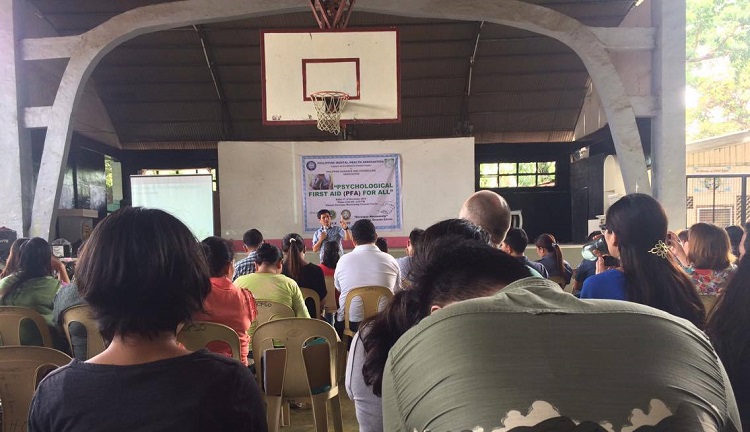
PSYCHOLOGICAL FIRST AID. Mental health practitioners, public officials, civil society groups, faculty, and students in the city join the workshop on psychological first aid workshop organized by the Cagayan de Oro - Misamis Oriental chapter of the Philippine Mental Health Association. Supplied photo.
By Rio Rosal B Baliling
The Cagayan de Oro - Misamis Oriental chapter of the Philippine Mental Health Association (PMHA), in partnership with Philippine Guidance and Counselling Association, Department of Health - Region X, and City Public Service Office, recently conducted a talk and workshop on psychological first aid, attended by mental health practitioners, faculty, and students in the city.
Bearing the theme, “Psychological First Aid for All,” the whole-day workshop was held at the covered courts of Barangay Macasandig on November 4.
Psychological first aid is defined as “an evidence-informed approach for assisting children, adolescents, adults, and families in the aftermath of a crisis, disaster, or terrorism event.”
Groups coming from both public and private sectors, namely, officers from the Philippine Drug Enforcement Agency, Philippine National Police - Region X, Armed Forces of the Philippines, Department of Social Welfare and Development, Kuya Fish Campaign Inc, barangay nutrition scholars, health workers, psychology faculty and students from Xavier University, Liceo de Cagayan University, and Lourdes College.
XU guidance counselor Rustum Salvaña, who served as a resource person, introduced the definition of psychological first aid and how important it is, particularly during natural and man-made disasters. Psychological first aid and medical first aid were also compared and contrasted.
PFA "is intended for anyone experiencing an overwhelming emotional response to a disaster or emergency, with or without a pre-existing condition. On the other hand, MFA is intended primarily for individuals with pre-existing psychiatric conditions experiencing an emergency."
Salvaña emphasized the PFA responder must evaluate who urgently needs help and recognize what is being asked as a responder, underscoring that a responder must be fit to handle different age groups. He added that the knowledge on PFA is important also for those who are handling the rehabilitation of the surrenderees of the present administration’s “War on Drugs.”
Meanwhile, the second resource speaker, XU Guidance and Counseling Office director Dr Charito Ferrer gave a psychosocial support training when working with children, adolescents, adults, elderlies, and with people with disabilities. She said that every age group has specific vulnerabilities, needs, and approaches.
In handling children, being the most sensitive group, it is important for the responders to learn about their traumas, the characteristics of their bereavement, and their way of coping. She highlighted the benefits of "play therapy" for children.
The workshop also discussed how the responders could take care of themselves while taking care of those who need their help so that at the end of the day, the responders can still attend to their needs.
Organized by PMHA and DOH, this workshop formed part of their awareness campaign to educate the people that psychological first aid is essential in giving support to people who have experienced traumatic events. ∎